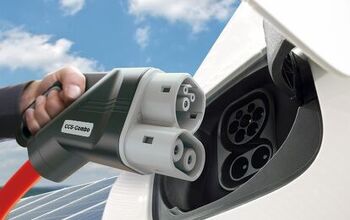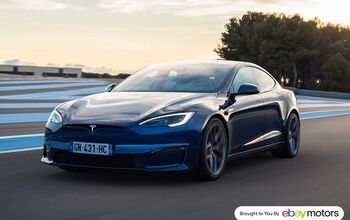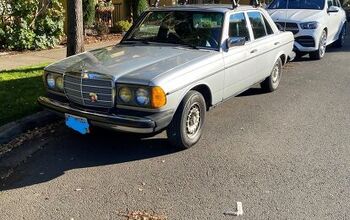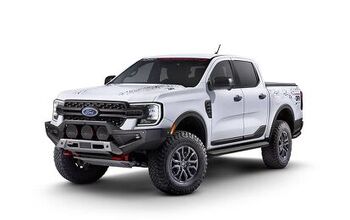Ford, BMW, VW, Daimler Prepare European Charging Network

Established German automakers, partnered with Ford Motor Co., are beginning construction on their pan-European fast-charging network this year. The plan is to expand charging points along highways — thus making cross-continent easier for EV owners and, more importantly, future electric-car buyers.
While none of that affects us in the West, the plot does provide some insight as to how quickly we might be able to expect something similar to take hold. Now called “Ionity,” VW announced it is roping in Porsche and Audi to help construct 400 high-power charging (HPC) stations by 2020. The first 20 charging stations are scheduled to open by the end of this year in Germany, Norway, and Austria.
The venture’s chief executive, Michael Hajesch, says Ionity wants grow that number to 50 by early 2018. “The first pan-European HPC network plays an essential role in establishing a market for electric vehicles. Ionity will deliver our common goal of providing customers with fast charging and digital payment capability, to facilitate long-distance travel,” Hajesch explained.
While starting the project in Germany and growing it out from there omits the whole of Europe from initial enjoyment, it does allow it to be genuinely functional for a smaller region. Theoretically, the United States could do the same thing and kind of is with VW’s Electrify America subsidiary — which is spending nearly half of its $2 billion budget in California. However, the majority of fast-charging stations built near North American highways thus far have been done by Tesla Motors or as part of state-funded projects.
Back in Europe, the Ionity charging stations are to be set roughly 120 km apart from each other. Most are planned to include facilities and shopping via Tank & Rast and Circle K. Capacity is said to be “up to 350 kW per charging point,” using the European charging standard Combined Charging System to significantly reduce charging times compared to existing systems.
“The launch of Ionity represents a breakthrough in the move towards a comprehensive rapid charging infrastructure in Europe”, said the chairman of Porsche’s executive board, Oliver Blume. “Creating a functioning charging infrastructure is necessary for ensuring electromobility is accepted and further expanded. With the rapid charging network from Ionity, we are ensuring that our customers can use electric cars on long journeys without compromising on convenience. These high-charging stations are capable of charging our Mission E to 80 per cent in just 15 minutes – equivalent to a range of 400 kilometres.”
[Image: Porsche]

A staunch consumer advocate tracking industry trends and regulation. Before joining TTAC, Matt spent a decade working for marketing and research firms based in NYC. Clients included several of the world’s largest automakers, global tire brands, and aftermarket part suppliers. Dissatisfied with the corporate world and resentful of having to wear suits everyday, he pivoted to writing about cars. Since then, that man has become an ardent supporter of the right-to-repair movement, been interviewed on the auto industry by national radio broadcasts, driven more rental cars than anyone ever should, participated in amateur rallying events, and received the requisite minimum training as sanctioned by the SCCA. Handy with a wrench, Matt grew up surrounded by Detroit auto workers and managed to get a pizza delivery job before he was legally eligible. He later found himself driving box trucks through Manhattan, guaranteeing future sympathy for actual truckers. He continues to conduct research pertaining to the automotive sector as an independent contractor and has since moved back to his native Michigan, closer to where the cars are born. A contrarian, Matt claims to prefer understeer — stating that front and all-wheel drive vehicles cater best to his driving style.
More by Matt Posky
Latest Car Reviews
Read moreLatest Product Reviews
Read moreRecent Comments
- EBFlex Honda all day long. Why? It's a Honda.
- Lou_BC My ex had issues with the turbo CRV not warming up in the winter.I'd lean to the normally aspirated RAV 4. In some cases asking people to chose is like asking a Muslim and Christian to pick their favourite religion.
- 3-On-The-Tree Agree turbo diesels are probably a different setup lower compression heat etc. I never towed with my rig and it was all 40 miles round trip to work with dealer synthetic oil 5,000mi changes. Don’t know the cause but it soured my opinion on turbo’s plus the added potential expense.
- DesertNative More 'Look at me! Look at me!' from Elon Musk. It's time to recognize that there's nothing to see here, folks and that this is just about pumping up the stock price. When there's a real product on the ground and available, then there will be something to which we can pay attention. Until then, ignore him.
- Bkojote Here's something you're bound to notice during ownership that won't come up in most reviews or test drives-Honda's Cruise Control system is terrible. Complete trash. While it has the ability to regulate speed if there's a car in front of you, if you're coasting down a long hill with nobody in front of you the car will keep gaining speed forcing you to hit the brakes (and disable cruise). It won't even use the CVT to engine brake, something every other manufacturer does. Toyota's system will downshift and maintain the set speed. The calibration on the ACC system Honda uses is also awful and clearly had minimum engineering effort.Here's another- those grille shutters get stuck the minute temperature drops below freezing meaning your engine goes into reduced power mode until you turn it off. The Rav4 may have them but I have yet to see this problem.


































Comments
Join the conversation
"While none of that affects us in the West..." Huh? "The West" includes all of the original members of NATO (most of which are European), together with a number of other European countries. So, this project affects most people in the geopolitical West.
The only effect it might have in America is which type of charging connection - CCS or CHAdeMO - will be utilized. I know BMW uses CCS as does GM but Nissan uses CHAdeMO. If one standard becomes more prevalent it could end this "VHS vs. Betamax" charging system we have today. Not to mention Tesla off in their own little corner